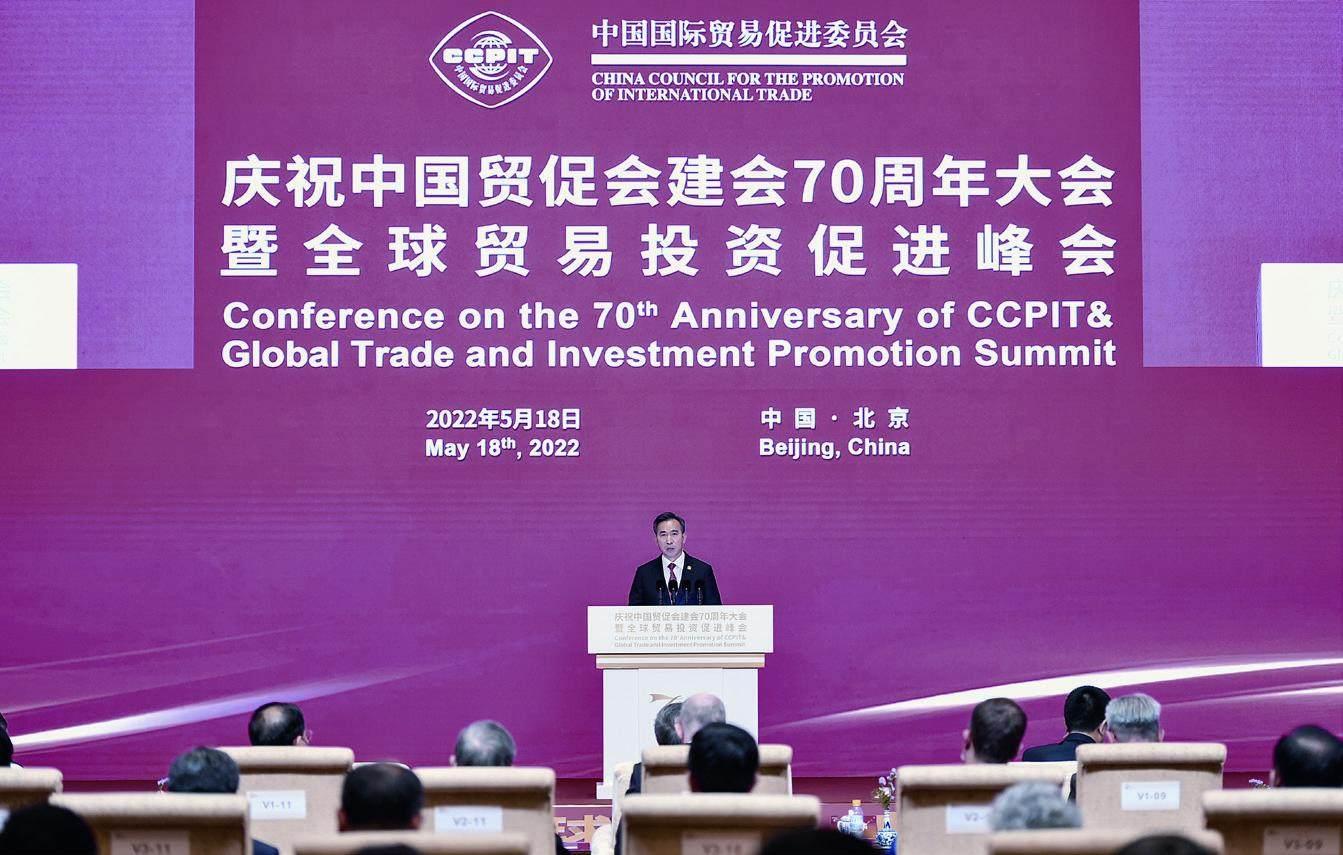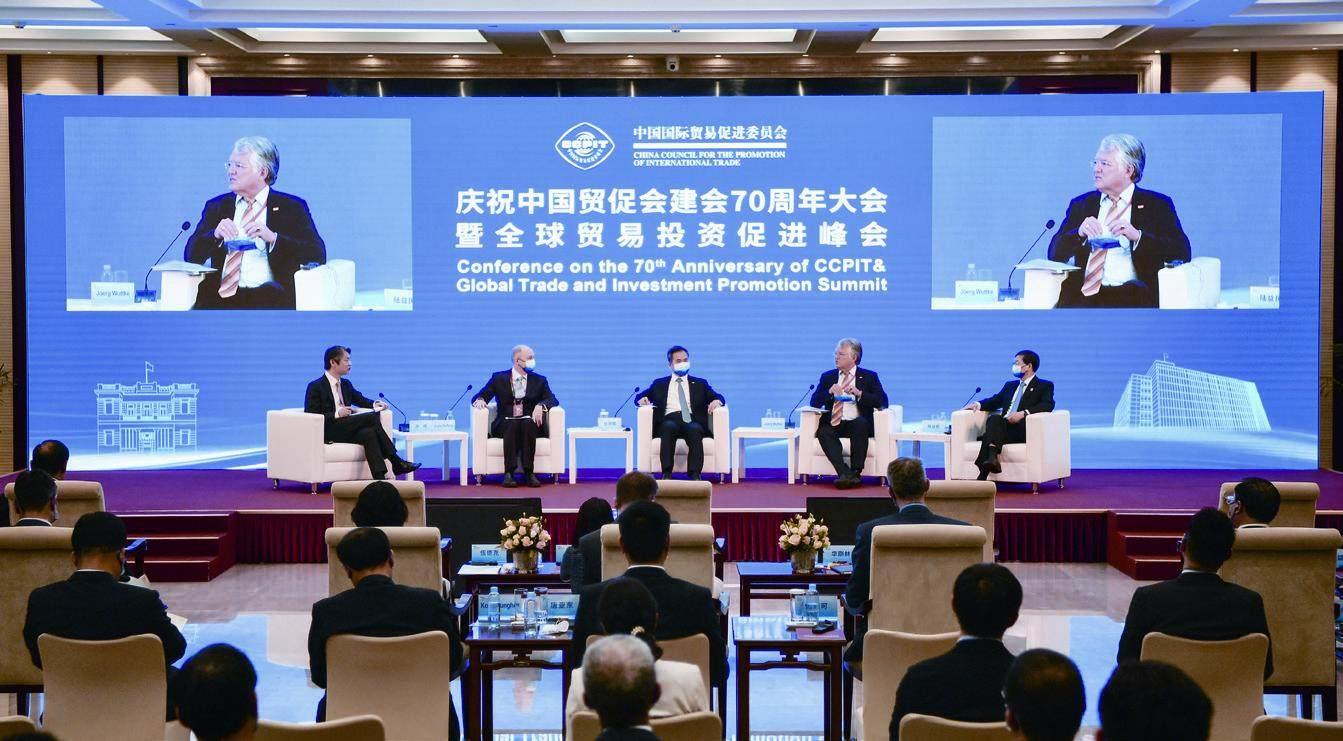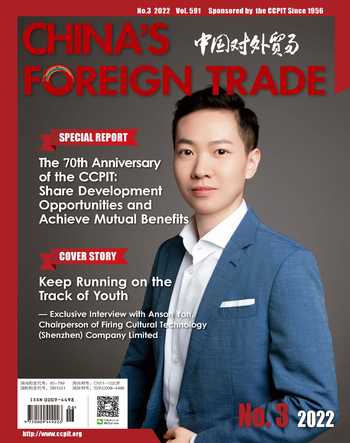The 70th Anniversary of the CCPIT:Share Development Opportunities and Achieve Mutual Benefits
By Lily Wang


“Founded in 1952 as a China-based institution with a global outlook, the CCPIT has been playing an important role in strengthening the bond of interest between Chinese and foreign businesses, promoting international economic and trade exchanges, and facilitating state-to-state relations. The 70-year journey of the CCPIT has been the epitome of Chinas ever-expanding openingup endeavor, and an important witness of how businesses from different countries can share in development opportunities and benefit from win-win cooperation.”
On May 18, President Xi Jinping delivered a video address at the Conference of the 70th Anniversary of the CCPIT and Global Trade and Investment Promotion Summit.
The conference was themed as“gathering trade promotion forces and jointly promoting openingup and development”. A total of about 11,000 people, including national leaders, people in charge of international organizations, delegates from business associations, trade promotion agencies and enterprises, joined the conference online to discuss future opportunities.
“Chinas resolve to open up at a high standard will not change”
Our world is facing a pandemic and drastic changes unseen in a century. Economic globalization is experiencing headwinds, and the world is entering a new period of volatility and transformation. Now more than ever, business communities across the world yearn for peace and development, call for fairness and justice, and aspire for win-win cooperation.
For this to happen, President Xi Jinping gave four suggestions:
The first is to pull together to defeat COVID-19. The pandemic has been going on unabated. Resurging with increasingly faster transmission, COVID-19 is posing a serious threat to the life and health of the people, and taking a heavy toll on the world economy. We must put people and their lives first, actively engage in international cooperation on vaccine R&D, production and distribution, bolster global public health governance, jointly build multiple lines of defence against the virus, and work for a global community of health for all.
The second is to reinvigorate trade and investment. We need to balance the pandemic response and economic development, strengthen macroeconomic policy coordination across countries, and get the global economy out of the woods at an early date. China has put forward a Global Development Initiative, which calls for concerted efforts to advance the UNs 2030 Agenda for Sustainable Development in all respects. We need to help the global economy upgrade its growth drivers, shift its growth model and adjust its structure so as to steer it onto a track of long-term, healthy and stable growth. We should support the WTO-centered multilateral trading regime, ensure security and stability of the global industrial and supply chains, and increase cooperation to allow development gains to better trickle down to people of all countries.
The third is to unleash the power of innovation in driving development. We should tap into the potential of innovation in spurring growth, jointly step up intellectual property protection, make rules on the basis of extensive participation and consensus building, and foster an open, fair, equitable and non-discriminatory environment for scientific and technological development. We should intensify exchanges and cooperation on innovation, facilitate integration of science and technology with economic growth, increase the sharing of innovation results, and remove all barriers that hamper the flow of knowledge, technology, talent and other factors of innovation.
The fourth is to improve on global governance. We should uphold true multilateralism, embrace a global governance vision featuring extensive consultation, joint contribution and shared benefits, and mobilize resources from across the world to meet global challenges and advance global development. We should choose dialogue over confrontation, tear down walls rather than erect them, pursue integration instead of decoupling, opt for inclusive ness, not exclusion, and guide reforms of the global governance system with the principle of fairness and justice.
President Xi Jinping reiterated that Chinas resolve to open up at a high standard will not change, and that the door of China will open wider to the world. China will continue to foster an enabling business environment that is based on market principles, governed by law and up to international standards. We will pursue high-standard implementation of the Regional Comprehensive Economic Partnership (RCEP) agreement and high-quality Belt and Road cooperation, and offer more market, investment and growth opportunities to the global business community. Let us join hands to uphold peace, development, cooperation and win-win partnership, work together to meet the problems facing the global economy, trade and investment, and jointly usher in an even brighter future.
Born and prosper from trade promotion
When Premier Li Keqiang attended the Symposium on the 70th Anniversary of the CCPIT, he said that in the past 70 years, the CCPIT has been playing an important role in deepening trade and economic cooperation between China and the world, and strengthened the people-to-people bond of different countries.
Li Keqiang said that international economic and trade exchanges are an important engine to promote world economic growth and the development of human society. The resilience and vitality of economic exchanges constitute a strong force to overcome all kinds of difficulties and challenges. At present, the international and regional situation is undergoing profound and complex changes. But we have to move forward despite such difficult challenges. China is willing to work with other countries to adhere to free trade and fair trade, ensure the stability and smoothness of global industrial chains and supply chains, and better safeguard international and regional peace, stability, development and prosperity.
Li Keqiang said that as the worlds largest developing country and economy, China has been deeply integrated into the world economy. To develop advanced manufacturing and modern service industries, we still need to expand imports. Chinas market has huge potential and there is a lot of room for investment. China is willing to work with enterprises of different countries to achieve winwin cooperation. We will help foreign enterprises in China to solve problems and take control and prevention further spread of the pandemic. The production and operation of the enterprise shall not stop. We will continue to provide better services in response to peoples general concerns.
Li Keqiang stressed that no matter how the international situation changes, China will unswervingly expand opening-up, deepen the reform of “delegating power, improving regulation, and upgrading services”, and create a market-oriented, legalized and international business environment. China will further relax market access, and continue to build China into a big market in the world and a hot land for foreign investment.
Vice Premier Hu Chunhua said that President Xi Jinping attached great importance to and cared about the work of the CCPIT. He delivered an important video speech at the summit, reviewed the development process of the CCPIT over the past 70 years, fully affirmed the important contributions made by the CCPIT, and placed high hopes on the better development and greater role of the CCPIT.
Hu Chunhua emphasized that the CCPIT system shall learn from the spirits of President Xi Jinpings important speech, and seek to play a more important role in serving high-quality development, building a new development pattern and expanding high-level opening-up. The CCPIT shall have the courage to forge ahead, constantly strengthen internal reform and construction, and move towards the goal of building a world-class trade promotion organization with Chinese characteristics and more vitality.
The CCPIT emerged and will prosper as a result of trade promotion.
CCPIT Chairman Ren Hongbin said that over the past 70 years, the CCPIT has always firmly grasped the basic task of serving enterprises, connecting government and enterprises, the domestic and foreign countries, the supply and demand, bridging cooperation between Chinese and foreign enterprises, safeguarding the rights and interests of enterprises, and providing advice and recommendations to help enterprises relieve difficulties. The CCPIT adheres to development and innovation by establishing Chinas first international commercial and maritime arbitration institution, initiating the international trademark patent agency business, and successfully hosting the Shanghai World Expo and the Expo 2019 Beijing. It focuses on giving full play to its advantages, actively carries out non-governmental diplomacy and economic diplomacy, plays a unique role in promoting governmental affairs through connecting people, and promoting political affairs through promoting the economy, and becomes an important messenger of non-governmental friendly exchanges. The CCPIT has been expanding the circle of international friends, working with the business circles of all countries to jointly promote openness and accommodation, and contribute wisdom to world economic growth.
Reach a consensus on win-win cooperation
During the summit, participants expressed their wishes to work more closely with China to promote sustainable development.
As a beneficiary of the joint construction of the the Belt and Road, Indonesian President Joko Widodo felt the benefits of win-win cooperation: China has been Indonesias largest trading partner for many years and the second largest source of investment in recent years. “At present, the world needs developed and developing countries to join hands to take stronger collective action and establish more inclusive cooperation. Indonesia will fully seize the opportunity of assuming the presidency of the G20 this year and actively promote this vision.”
“I would like to thank China for providing Ecuador with vaccines in a timely manner,” Ecuadorian President Guillermo Lasso said that nearly 60% of Ecuadors COVID-19 vaccines came from China, and China has played an important role in promoting the phased progress of global vaccination for managing COVID-19 pandemic. He said that the summit has built a bridge between government and enterprises, helped to strengthen multilateralism and free trade, promoted economic cooperation and made positive contributions to world economic recovery and sustainable development. Ecuador will prioritize joining the Pacific Alliance(Latin America) and the Comprehensive and Progressive Agreement for Trans Pacific Partnership (CPTPP) in its diplomatic policy. At present, the focus of Ecuador is to sign a free trade agreement with China, so as to strengthen trade relations between the two countries, and diversify them. Ecuador welcomes Chinas investment in the fields of oil and gas, mining, telecommunications, energy and infrastructure.
WTO Director-General Ngozi Okonjo-Iweala said that the WTO has always been a source of stability and predictability for world trade and has contributed to the well-being of people all over the world, including China. “At present, international cooperation is more important than ever in the face of the risks of the COVID-19, regional conflict, food crisis, environmental degradation and economic recession.”
ASEAN Secretary General Lim Jock Hoi said that over the past few decades, the CCPIT has successfully promoted Chinas foreign trade and investment cooperation by strengthening public-private dialogue and commercial networks. The economic relationship between ASEAN and China has never been as strong and close as it is today. Twenty years ago, the two sides reached the first agreement of the free trade zone between ASEAN and China (RCEP). Today, tariffs on more than 90% of goods have been phased out, and restrictive measures on services and investment have been largely eliminated. In order to cope with the rapidly changing global economic pattern in the post-pandemic period, ASEAN and China are building a new forward-looking partnership. At the ASEAN-China Special Summit to Commemorate the 30th Anniversary of ASEAN-China Dialogue Relations in 2021, leaders of ASEAN member states and China agreed to establish a mutually beneficial ASEAN-China comprehensive strategic partnership. “During the period of pandemic, all parties work together to promote market opening and facilitate trade and investment, which is very important for maintaining the security of the global industrial chain and supply chain.”
Khek M. Caimealy, Cambodian Ambassador to China, said that in order to promote economic recovery in the post-pandemic period, all parties shall jointly promote and strengthen cooperation in various fields of the the Belt and Road, especially infrastructure construction and connectivity projects. “We should make full use of the RCEP agreement to promote the regional trade and investment environment and strengthen trade and investment liberalization. We should accelerate the construction of digital infrastructure, maintain the security and stability of cyberspace, create a new pattern of digital governance, and widely strengthen digital economy and e-commerce cooperation. We should implement preferential investment policies to support the local production of raw materials, so as to fully provide the disposable resources needed by economic globalization, effectively reduce production costs and maintain the stable growth of the supply chain.”
Join hands to revitalize the world economy
As the COVID-19 pandemic continues to spread in the world and economic globalization is experiencing headwinds, business circles of both China and foreign countries shall work closely and overcome the difficulties.
Kono Yohei, Chairman of the Association for the Promotion of Internation Trade, Japan, said that facing the global pandemic and complex international situations, he expected economic groups of the world to enhance economic promotions and make more contributions to the world peace and stability.
Looking back to the cooperation with the CCPIT in the past 50 years, President of US-China Business Council Craig Allen said, “with the long journeys of bilateral cooperation, the American businesses have acquired deep knowledge about China and developed the system of supplier network, technology and talent. Through cooperation, we are able to help Chinese enterprises integrate into the global supply chain, which is increasingly inseparable from China. There is no doubt that our two countries, peoples and economies have benefited from this successful cooperation.”
Colm Rafferty, Chairman of AmCham China, said that the pandemic has accelerated the digital transformation of the global economy. As leaders in technology R&D and implementation, China and the U.S. play an important leading role in global economic recovery. It is hoped that the two countries can jointly meet some policy challenges, including market access, export control, network security, digital localization and encryption. He stressed that for American enterprises, the Chinese market is still very important.“For our member enterprises, China is definitely one of the top three important markets.” But at the same time, he pointed out that under the pandemic, the supply chain issue has also brought challenges to the member enterprises. He hopes to work with the CCPIT and other stakeholders to jointly tackle these difficulties.
Sergio Ley Lopez, Chairman of Asia-Pacific Regional Committee of Mexican Business Council for Foreign Trade, Investment and Technology, said, “China-Mexico diplomatic relations are at the best moment in history. As a country with open trade, Mexico is able to become a gateway for Chinese enterprises to enter Latin America and the Caribbean region.”He pointed out that in recent years, the trade volume between China and Mexico has maintained a rapid growth momentum. He hoped that the two countries would continue to deepen economic and trade cooperation in the future, not only to make bilateral trade more balanced, but also to attract more Chinese investment in Mexico.
Sergey Katyrin, President of the Chamber of Commerce and Industry of the Russian Federation, said that Russia and China have huge cooperation opportunities in the nuclear use for peaceful purposes, development of green agriculture and production of electric vehicles.
Poj Aramwattananont, Chairman of the APEC 2022 Business Summit, said that the technological innovation is crucial to green development. Innovation can promote the transformation and upgrading of industrial structure and reduce the loss of natural resources. These reforms are very important to improve the global economic structure.
Yu Jeoung Yeol, President & CEO of Korea Trade-Investment Promotion Agency, said that in the past two years, the COVID-19 pandemic has changed the global business environment and rapidly restructured the global supply chain. “In the past, we focused on low cost and high efficiency. Now we focus on stability and resilience. Many countries regard the supply chain an issue that is more important for the national economy and industry. They are striving to build predictable and stable production technology.”
Yu Jeoung Yeol said that the reorganization of supply chain makes cooperation more and more necessary. In order to ensure the supply and sales of core components, enterprises are trying to seek the stability of the supply chain by diversifying import channels and mastering core technologies. From this perspective, cooperation within the region or among relevant countries is becoming more and more important compared with “national priority”. Therefore, as major digital innovation countries, China and South Korea have been working closely in the field of technology and investment, which is of great significance for the post-pandemic development of the two countries and even the world economic recovery.
- China’s foreign Trade的其它文章
- The Beijing Initiative of the Global Trade and Investment Promotion Summit Was Released
- CCPIT Signs MOU on Strategic Cooperation with SINOSURE
- The 2022 Boao Forum for Asia for Global Development and A Shared Future
- China and New Zealand Move to“RCEP+”Cooperation
- China Is Still Regarded As One of the Major Strategic Markets
- China-Thailand Trade Enjoys Multiple Dividends With the Effect of the RCEP

